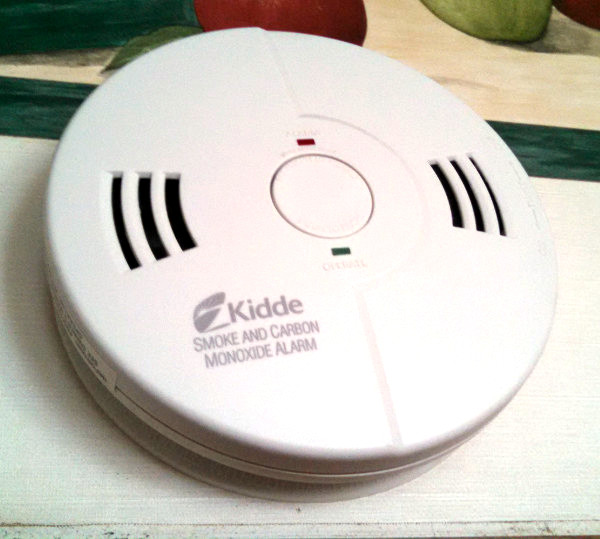What Kind of Smoke Detectors and Carbon Monoxide Detectors do Landlords need to Provide?
| . Posted in best landlord practices, News - 11 Comments

New Mass fire code effective December 1, 2016 requires landlords to update their units.
Landlords need to know what kind of smoke detectors and carbon monoxide detectors to install in their units. Remember that just because they were legal yesterday doesn’t mean they’re legal today! Here is part of the new Mass fire code effective December 1, 2016:
13.7.5.1.1 Nonrechargeable, Nonreplaceable Battery Power Alarms/Detectors
(1) Photoelectric technology shall be required for smoke alarms and detectors
(2) A silence button shall be required on each alarm and detector device within its control panel
(3) Each smoke alarm and detector device shall be equipped with a nonrechargeable battery
(4) Each smoke alarm and detector device shall be equipped with a nonreplaceable battery
(5) All power requirements for all smoke alarms and detectors are met for at least 10 years of
battery life, including weekly testing.
(6) All power requirements for combination alarms with smoke/carbon monoxide shall be
capable of powering the unit for its service life, including testing.
In plain English: anywhere you have smoke detectors or a carbon monoxide detector, they must have a 10-year permanent battery. Also, note that ionization smoke detectors are no longer counted. Smoke detectors must use “photoelectric technology.”
On the one hand, this is bad news, because photoelectric smoke detectors are expensive, and the sudden change in Mass fire code might mean they’re going to be expensive for a while.
On the other hand, ten year batteries are good for landlords. How many times have we cleaned up after a tenant move-out only to find one or all of the smoke detectors batteryless and thrown into a closet? Chirping detectors are an annoyance, especially in the middle of the night. Ten year batteries help us all stay a little safer with a little less work and nuisance.
So pay attention to the new Mass fire code for smoke detectors and carbon monoxide detectors! The lives of your customers depend on it!
Are Ten Year Batteries Required for Carbon Monoxide Alarms?
The code is ambiguous in its usage of the phrase "alarm" vs. "detector" and in its application of this noun to the modifiers "smoke" and "carbon monoxide." Usually where it says "detector" it means "smoke detector," but in three places it says "carbon monoxide detector". We adopt a conservative reading of this code. We advise ten-year batteries on all detectors whatever their purpose, including smoke and carbon monoxide detectors.
Note that emails, text messages or other communications from fire prevention professionals, even at the state Department of Fire Services, are not legally binding pronouncements. Any official saying they won't require ten year batteries on a CO detector is only able to guarantee that with respect to their own enforcement, not with respect to others' enforcement, with respect to your insurance provider, or with respect to any renter's personal injury attorney. Please do the best you can and use ten-year batteries everywhere, or hardwire your detectors.





Your article is a bit misleading and I think you are missing some information here.
Some of these changes only apply when a home is sold or to a 1-2 family home. Please do some basic research before posting an article.
Eric,
Thank you for commenting. Can you elaborate on why our post is misleading?
Just so you’re aware, this article is meant to bring the change to the attention of landlords and property managers, not to give a full run down of the fire code. We direct readers to Mass.gov for full elaboration on the changes in the code.
I hope this helps to clear things up for you.
Eric,
I believe we have correctly reported this change in the requirement, and that media stories describing the change as applicable only to sales of 1- and 2- families were incorrect.
Through establish case law, landlords issue a “warranty of habitability” that require us to follow the state sanitary code at all times. It reads:
410.482: Smoke Detectors and Carbon Monoxide Alarms
(A) Owners shall provide, install, and maintain in operable condition smoke detectors and carbon monoxide
alarms in every dwelling that is required to be equipped with smoke detectors and carbon monoxide alarms in
accordance with any provision of the Massachusetts General Laws and any applicable regulations of the State
Board of Fire Prevention (527 CMR).
The MA fire code (527 CMR) reads, “First see the NFPA Code”, which reads:
13.7.1 General
13.7.1.1 Where building fire alarm systems or automatic fire detectors are required by other sections of this Code, they shall be provided and installed in accordance with Section 13.7.
And MA regulation modifies the NFPA code as follows:
13.7.5 Primary Power Source
13.7.5.1 Smoke alarms/detectors, and carbon monoxide alarms shall be permitted to have battery
power as a primary source unless otherwise prohibited by applicable laws, codes, or standards.
13.7.5.1.1 Nonrechargeable, Nonreplaceable Battery Power Alarms/Detectors
(1) Photoelectric technology shall be required for smoke alarms and detectors
(2) A silence button shall be required on each alarm and detector device within its control panel
(3) Each smoke alarm and detector device shall be equipped with a nonrechargeable battery
(4) Each smoke alarm and detector device shall be equipped with a nonreplaceable battery
(5) All power requirements for all smoke alarms and detectors are met for at least 10 years of
battery life, including weekly testing.
If you can cite higher-level headers in the NFPA code that show this language applies only to sale or transfer, we will amend this article. You can review it yourself by following the instructions/links here:
http://www.mass.gov/courts/case-legal-res/law-lib/laws-by-source/cmr/500-599cmr/527cmr.html
In all seriousness, if we got it wrong, cite chapter and verse! We want to know.
My tenant of my single family home in MA says her daughter ( who is a realtor in Boston) told her that an electrician needs to inspect and assess the smoke detectors in the house to insure that in the case of a fire, my insurance co will pay for any damage. Is this true? I have tried to research this and find no requirement. She has been a tenant for the past 4 years, and I’ve replaced the smoke detectors when they’ve needed it. thanks.
Landlords are required to maintain their building in compliance with the sanitary and building code at all times, and this includes the fire code, which is very complicated and usually building-specific. Any non-compliance could result in a claim being denied. When in doubt, don’t rely on an electrician or a local official. Contact the State Fire Marshall, Division of Fire Safety, directly and ask for a building-specific inspection: https://www.mass.gov/info-details/dfs-staff-list-and-directory
Thanks for explaining that smoke detectors need to have a ten year battery. My husband and I just bought a retail building. Your tips will help as we have the fire alarm system tested and brought up to date.
The carbon monoxide detector in my apartment was just installed in late September to October and it’s already chirping. Contacting the landlord didn’t do anything he neither replied or came by. By state laws both carbon monoxide detector and smoke detector are required in apartments. That means it is the landlord’s responsibility to check them and replace the batteries
I agree with you that it is important for landlords to be aware of the type of smoke detectors installed in their property. I also believe that it is within the landlord’s responsibility to ensure the smoke detectors are serviced and regularly maintained. My daughter is planning to rent an apartment with her friends and I will remind her to ask about the smoke detector system with her landlord.
A fire alarm beeps about every minute or so. I have notified my landlord more than 24 hours again and despite promising to fix it, he has not done so. This is definitely a nuisance. Is it also a code violation? Regardless of answer and references to support your answer would be appreciated.
My tenant keeps removing the smoke detectors after I repeatedly asked them to put it back. If I start an eviction, would a 30 day notice to quit be required? How many warnings do I need to give him for it to hold up in court? He is a tenancy at will.
Does this 10 year rule apply to smoke detectors that have the three wires in the back? We have the three wires wired on ours so when one goes off they all go off, but they have 9V battery as a backup. Do I need to update them? Your help is much appreciated.